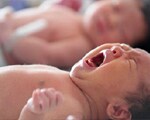The findings suggest that the association between vitamin D and wheezing, which can be a symptom of many respiratory diseases and not just asthma, is largely due to respiratory infections.

Earlier research has suggested that mothers who have higher levels of vitamin D in their blood during pregnancy are more likely to give birth to infants who are at a lower risk for wheezing.
Vitamin D, found abundantly in fortified dairy products such as milk and cheese, is known for helping children build strong bones, but it can also help bolster the immune system. Vitamin D is also produced by the body when exposed to sunlight. Acute respiratory infections are a major health problem in children. Bronchiolitis, in particular, is a leading cause of hospitalisation among infants.
Researchers examined whether vitamin D levels in the infants' umbilical cord blood were associated with risk for respiratory infections, wheezing, or asthma. They analysed data on more than 1,000 children in New Zealand. Umbilical cord samples were available from 922 infants. Most infants were born at term (40 weeks), and the average birth weight was about 3.6 kilograms or about 7 pounds and 9 ounces.
Mothers were also frequently interviewed about their children's history of asthma, wheezing, and respiratory infection from age 3 months until the children turned 5 years old. Very few children in the study took vitamin supplements; their vitamin D status came mostly from sunlight exposure.
It was found that about 20% of infants had 25-hydroxyvitamin D levels below 25 nmol/L, which is considered below normal vitamin D levels. The average level of 25-hydroxyvitamin D was 44 nmol/L, which was still considered low. Lower vitamin D levels were more common among children born in the winter, children of lower socioeconomic status, children who had family histories of asthma and smoking and who had been exposed to secondhand smoke at an early age. Low vitamin D levels were associated with wheezing and respiratory infection, but not associated with being diagnosed with asthma. However, the findings do not establish cause and effect.
The findings suggest that the association between vitamin D and wheezing, which can be a symptom of many respiratory diseases and not just asthma, is largely due to respiratory infections. There's a likely difference between what causes asthma and what causes existing asthma to get worse. Since respiratory infections are the most common cause of asthma exacerbations, vitamin D supplements may help to prevent these.
DoctorNDTV is the one stop site for all your health needs providing the most credible health information, health news and tips with expert advice on healthy living, diet plans, informative videos etc. You can get the most relevant and accurate info you need about health problems like diabetes, cancer, pregnancy, HIV and AIDS, weight loss and many other lifestyle diseases. We have a panel of over 350 experts who help us develop content by giving their valuable inputs and bringing to us the latest in the world of healthcare.












